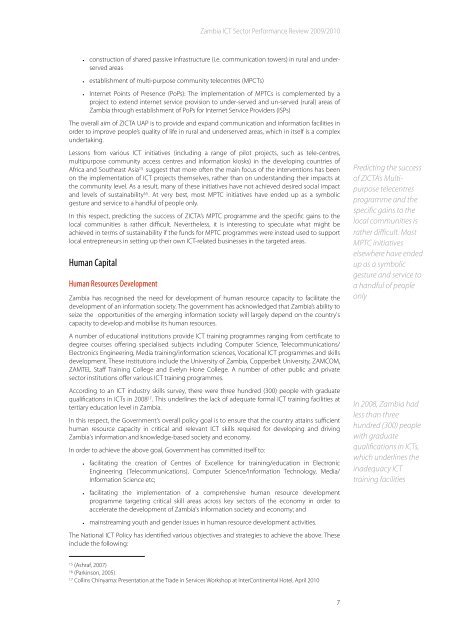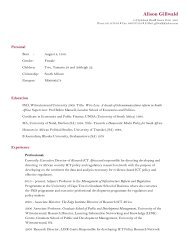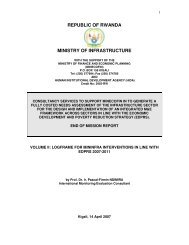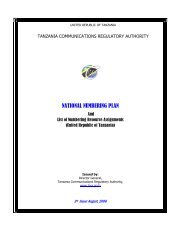Zambia ICT Sector Performance Review 2010 - Research ICT Africa
Zambia ICT Sector Performance Review 2010 - Research ICT Africa
Zambia ICT Sector Performance Review 2010 - Research ICT Africa
Create successful ePaper yourself
Turn your PDF publications into a flip-book with our unique Google optimized e-Paper software.
<strong>Zambia</strong> <strong>ICT</strong> <strong>Sector</strong> <strong>Performance</strong> <strong>Review</strong> 2009/<strong>2010</strong><br />
• construction of shared passive infrastructure (i.e. communication towers) in rural and underserved<br />
areas<br />
• establishment of multi-purpose community telecentres (MPCTs)<br />
• Internet Points of Presence (PoPs): The implementation of MPTCs is complemented by a<br />
project to extend internet service provision to under-served and un-served (rural) areas of<br />
<strong>Zambia</strong> through establishment of PoPs for Internet Service Providers (ISPs)<br />
The overall aim of Z<strong>ICT</strong>A UAP is to provide and expand communication and information facilities in<br />
order to improve people’s quality of life in rural and underserved areas, which in itself is a complex<br />
undertaking.<br />
Lessons from various <strong>ICT</strong> initiatives (including a range of pilot projects, such as tele-centres,<br />
multipurpose community access centres and information kiosks) in the developing countries of<br />
<strong>Africa</strong> and Southeast Asia 15 suggest that more often the main focus of the interventions has been<br />
on the implementation of <strong>ICT</strong> projects themselves, rather than on understanding their impacts at<br />
the community level. As a result, many of these initiatives have not achieved desired social impact<br />
and levels of sustainability 16 . At very best, most MPTC initiatives have ended up as a symbolic<br />
gesture and service to a handful of people only.<br />
In this respect, predicting the success of Z<strong>ICT</strong>A’s MPTC programme and the specific gains to the<br />
local communities is rather difficult. Nevertheless, it is interesting to speculate what might be<br />
achieved in terms of sustainability if the funds for MPTC programmes were instead used to support<br />
local entrepreneurs in setting up their own <strong>ICT</strong>-related businesses in the targeted areas.<br />
Human Capital<br />
Human Resources Development<br />
<strong>Zambia</strong> has recognised the need for development of human resource capacity to facilitate the<br />
development of an information society. The government has acknowledged that <strong>Zambia</strong>’s ability to<br />
seize the opportunities of the emerging information society will largely depend on the country's<br />
capacity to develop and mobilise its human resources.<br />
A number of educational institutions provide <strong>ICT</strong> training programmes ranging from certificate to<br />
degree courses offering specialised subjects including Computer Science, Telecommunications/<br />
Electronics Engineering, Media training/information sciences, Vocational <strong>ICT</strong> programmes and skills<br />
development. These institutions include the University of <strong>Zambia</strong>, Copperbelt University, ZAMCOM,<br />
ZAMTEL Staff Training College and Evelyn Hone College. A number of other public and private<br />
sector institutions offer various <strong>ICT</strong> training programmes.<br />
According to an <strong>ICT</strong> industry skills survey, there were three hundred (300) people with graduate<br />
qualifications in <strong>ICT</strong>s in 2008 17 . This underlines the lack of adequate formal <strong>ICT</strong> training facilities at<br />
tertiary education level in <strong>Zambia</strong>.<br />
In this respect, the Government’s overall policy goal is to ensure that the country attains sufficient<br />
human resource capacity in critical and relevant <strong>ICT</strong> skills required for developing and driving<br />
<strong>Zambia</strong>'s information and knowledge-based society and economy.<br />
In order to achieve the above goal, Government has committed itself to:<br />
• facilitating the creation of Centres of Excellence for training/education in Electronic<br />
Engineering (Telecommunications), Computer Science/Information Technology, Media/<br />
Information Science etc;<br />
• facilitating the implementation of a comprehensive human resource development<br />
programme targeting critical skill areas across key sectors of the economy in order to<br />
accelerate the development of <strong>Zambia</strong>'s information society and economy; and<br />
• mainstreaming youth and gender issues in human resource development activities.<br />
The National <strong>ICT</strong> Policy has identified various objectives and strategies to achieve the above. These<br />
include the following:<br />
Predicting the success<br />
of Z<strong>ICT</strong>A’s Multipurpose<br />
telecentres<br />
programme and the<br />
specific gains to the<br />
local communities is<br />
rather difficult. Most<br />
MPTC initiatives<br />
elsewhere have ended<br />
up as a symbolic<br />
gesture and service to<br />
a handful of people<br />
only<br />
In 2008, <strong>Zambia</strong> had<br />
less than three<br />
hundred (300) people<br />
with graduate<br />
qualifications in <strong>ICT</strong>s,<br />
which underlines the<br />
inadequacy <strong>ICT</strong><br />
training facilities<br />
15 (Ashraf, 2007)<br />
16 (Parkinson, 2005)<br />
17 Collins Chinyama: Presentation at the Trade in Services Workshop at InterContinental Hotel, April <strong>2010</strong><br />
7
















